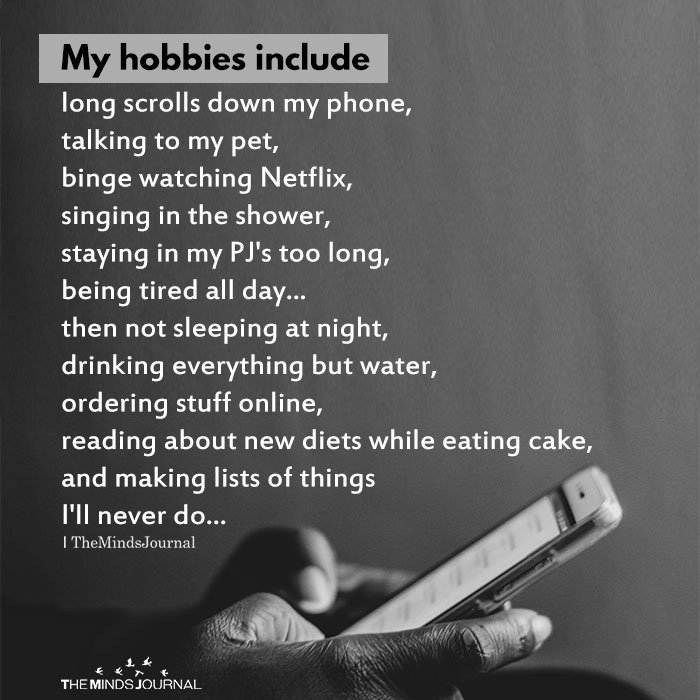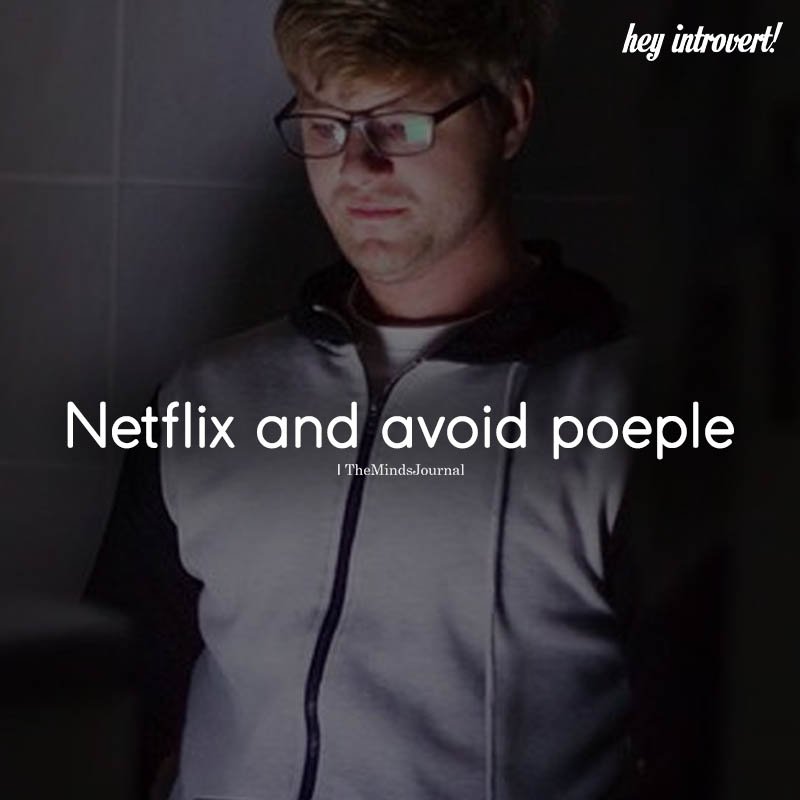“Netflix And Chill” sounds like a great idea to most of us after a long day as we sit down with our favorite comfort food or a cup of coffee and simply unwind. But did you know that binge watching show after show on streaming services can actually be bad for you? Let us take a deep dive into the darkness that lies beyond the pixels of your screen.
Are You Addicted To Netflix?

According to a recent 2021 study, binge viewing is “a potentially addictive behavior” similar to other behavioral addictions, like gambling that involves craving, dependency, pleasure anticipation, avoidance & loss of control. The study found that around 73% of Americans binge on shows on streaming platforms leading to sedentary lifestyles & unhealthy eating behaviors. This negatively affects their psychological, emotional, physical and social well-being. The researchers observed that binge-watchers are more prone to social isolation, anxiety and depression than the general population. “Binge-watching correlates with psychological and mental health symptoms including stress, loneliness, insomnia, depression and anxiety,” explain researchers of another recent study.
Further research shows that being addicted to streaming platforms like Netflix, Apple TV or Amazon Prime Video can not only affect your health arising from a lack of movement and exercise, but also lead to several other issues, such as –
- Reduced sleep quality and increased insomnia
- Mental health issues
- Procrastination
- Lack of control
- Poor performance at school or work
- Less effective day-to-day functioning
- Poor social life
Another 2021 research paper found that problematic binge watching is closely associated with mental health problems and can lead to “depression, social interaction anxiety, and loneliness risks among adults.” Studies have also established a relationship between constantly watching television or online shows and anxiety-depressive syndrome as well as motivation. Researchers believe that physical health problems like obesity are also strongly connected with binge viewing. Moreover, it can also make us neglect our work and relationships even when we may realize that’s not how we should act. As it becomes an addiction, it becomes increasingly difficult for us to overcome the desire to watch more episodes constantly.
Related: How Depression and Addiction Can Be Correlated
The Joy Of Binge Watching

The weekend is finally here. You breathe a sigh of relief as you can finally relax after a long, tiring week. You get into your pajamas, grab some food and turn on your TV or laptop. You scroll through Netflix and realize that the latest season of Cobra Kai is finally here. But wait. You have stuff to do this weekend. From cleaning out your room and fixing the sink to working on your personal projects and investing more time in your side hustle. You exhale deeply and tell yourself you will get to it right after finishing the first episode. You tell yourself it’s just a few minutes and you deserve to take a break. But before you know it, the weekend is over, you have binged on all episodes of Cobra Kai, your room is still a mess, the sink is still wobbly, and you did not work on your projects that could have helped you earn more money. So now you feel stressed, frustrated, anxious and even a little bit depressed as you need to get more work done the next weekend. “Netflix And Chill” is not exactly as relaxing as it is made out to be. Is it?
But the problem is not with Netflix or any other streaming service. The problem is how we use binge watching as a sugar-coated poison pill to procrastinate, be lazy and runaway from finding solutions to our problems. Probably not what you want to hear right now, but the truth is always bitter. We binge watch shows less to be entertained, and more to escape from our realities. And that is where the problem lies.
Related: Internet Addiction: How Does It Affect Your Mind And Body?
Can You Actually “Chill” With Netflix?
We all love watching our favorite shows and I have to admit, some of these are pretty binge-worthy. Whether you’re on Netflix, Amazon Prime, HBO Max, Hulu, Disney+ or all of them, watching the latest shows before others is fast becoming a social trend, especially in the new post-pandemic era. According to studies, after the COVID-19 pandemic viewing habits of people have changed drastically. “Netflix saw an unexpected influx of revenue, new subscribers, and time spent viewing in spring of 2020,” adds a recent study. As we become more and more disconnected from others, both physically and emotionally, watching shows on streaming platforms encourages us to enjoy our alone time. It makes us relax, de-stress, feel comfortable and even excited. It makes us connect with our beloved fictional characters and relate to them on a personal level.
But have you pondered where this leads you to? Blindly swimming in the sea of endless streaming platforms and riding on the waves of the latest shows and movies can often make you drowned in depression and impulsivity. Binge watching can easily become an unhealthy habit and turn into an addiction when you sidetrack other important activities and indulge in watching shows mindlessly on a regular basis. “Research has shown that binge-watching is an event that is very engaging both emotionally and cognitively, which may lead to loss of control over the number of watched episodes,” explains a new study.
Related: What You Should Know When Struggling With Addiction and Depression
The Binging Problem
Binge behaviors are described as “a strong propensity to implement or repeat a certain behavior in a short period of time.” Hence, binge watching or binge-viewing refers to the act of watching several episodes of a show, typically 2-6 episodes, in a single sitting. The truth is, we have all been guilty of binging on our favorite shows on Netflix. We know exactly what it means and feels like. And we also know the devastating feeling that ensues eventually, the feeling of wasting time and not getting important things done. We feel bad, we regret and to ease out our emotional discomfort and start watching another show to take our mind off the guilt that creeps up from inside. However, this can easily become problematic and you will soon find yourself addicted and unable to break free from this damaging habit.
The problem with binging is not with the number of episodes or hours you have binged, but whether this behavior is negatively affecting other important aspects of your professional, social and personal life. Some researchers believe that a “binge-worthy” series can be compared to “potato chips – tasty for sure, impossible to stop snacking, utterly lacking intellectual value, and after binging likely to make viewers feel a bit ill and ultimately feel displeased, which engender to binge more.”
The Escape We All Need
Most of us are aware of all these negative effects of binge viewing shows on TV or streaming platforms, if not consciously, then at least subconsciously for sure. Post-binge-watching blues is a real phenomenon and has been confirmed by science. But why do we repeatedly engage in this meaningless activity that does not add any true value to our lives? Cause Netflix serves as an antidepressant to our stress-ridden lives. It is a vortex we can escape into and avoid all our troubles and responsibilities and just be. These fictional shows pull us into their exciting worlds and make us experience instant gratification and feel excited and energized, something we rarely feel normally in the real world.
Researchers from a 2012 study found that self-control is a finite resource which can deplete the more we use it. Hence, we can often feel drained of self-control when engaged in effortful tasks. Although positive social interaction can help to increase our self-control, negative interpersonal interactions, like being subjected to criticism or arguments, can drastically deplete self-control. This is where the concept of social surrogate restoration comes into play. It refers to “the possibility that people seek a social surrogate when depleted, and that seeking social surrogacy restores self-control,” explains the study.
The researchers found that we tend to binge watch our favorite shows “after exerting effortful self-control” as “immersion in this familiar fictional world restores self-control.” Moreover, this can also seemingly add value to our social lives as you can talk about this fictional world and characters with your friends who watch the same shows to feel more connected socially.
Related: 10 Signs That Show Loneliness Has Taken Over Your Life
A Life Without Passion
Did you know that the average American watches video-streaming services like Netflix for around 3.2 hours every single day, especially since the pandemic hit? That is a lot of time we just waste meaninglessly.
But what else am I supposed to do if I don’t watch Netflix?
I don’t have anything better to do.
I’ve already had a long day plus I am stuck at home most of the time.
Oh, but you have a lot of better things to do if you put your mind to it. Unfortunately, we are creatures of habit and wasting time staring at our screen has become a serious unhealthy habit for most of us. We believe we have nothing better to do so we Netflix and Chill, but in reality all of us have certain passions, interests and hobbies that we can pursue. We all have something we wanted to learn for a long time. Yet, we refuse to put in the effort to do that. This is not simply because we deplete our self-control, but because we lack passion for life. We all complain about how boring our lives are, but do we ever take a look inside and realize how boring we ourselves are? We live a life without passion and by watching shows with passionate characters living exciting lives, we console ourselves instead of putting in real effort to make our lives better.
By serially binge watching episode after episode, day after day, we tell ourselves that we are not good enough to improve ourselves or our lives. We tell ourselves that the goals we wish to achieve will never be accomplished. We simply give up on ourselves and accept defeat blindly. This is why we need to be aware of our video streaming and watching habits and take steps to refuse the urge to stay glued to the screen.

Related: 7 Strategies For Smarter Decision-Making, According to Science
How To Stop Uncontrollable Binge Watching
Before we get started, let me make this clear one more time – I am not saying that Netflix or any other streaming service is evil. They are entertainment portals who provide entertaining shows and movies. That’s what they are there for and they are doing a great job. It is how we consume this entertainment and with what purpose – that is where the problem lies. So our solution should be focused on changing our own mindset and habits instead of canceling our Netflix subscription.
Here are few helpful ways to overcome your binge watching addiction, stop being boring and lazy and live a more passionate life:
1. Identify your reasons for binge watching
Try to understand what makes you binge watch Netflix uncontrollably. Experts believe that stress is one of the primary motivators for binge viewing. “Stress is associated with increased TV viewing, suggesting that individuals were watching TV to cope with stress,” explains a 2021 study. Apart from stress, other common reasons for binging on Netflix include loneliness, fear of missing out (FOMO), escapism and boredom.
If you are escaping to Netflix to cope with stress and boredom, then it is better to look for alternate activities you can engage in as a replacement. You should also focus on your mental and emotional needs and address them rather than wasting time watching shows. You can try out healthier, alternate activities like going to the gym, reading a book, writing a journal or learning a new skill. However, if you feel you are unable to cope with stress and other mental health issues and using Netflix as a coping strategy, then talking to a mental health professional or a therapist is advised as they can help you better identify your issues and recover from your TV addiction.
2. Practice self-control
According to a study, using our self-control to manage excess social media use is one of the most effective ways. The researchers found that reactive and proactive methods of self-control can help to stop excess social media use and binge watching. Reactive methods include the strategies we use the moment we have the urge to engage in such unhealthy behavior. It will require you to have direct and targeted self-control and engage in positive self-talk. Proactive methods of self-control involve strategies that focus on changing habits in the long run. Here the focus is on developing healthier habits and instilling lifestyle changes that weaken your urges for “Netflix and Chill.” However, the study found that proactive strategies are relatively more effective than reactive methods.
Related: 3 Ways Incorporating Routines Can Benefit Your Mental Health
Here are a few ways to implement reactive and proactive strategies to curb your Netflix addiction:
- Prioritize your daily tasks
- Maintain balance between tech use and other aspects of your life
- Keep scheduled timings for watching shows on a daily or weekly basis and limit your screen time
- Turn all unimportant notifications and autoplay options
- Limit your access to apps and video streaming platforms
3. Use Netflix as a reward
Regardless of how much self-control you may implement, we all want to just relax and enjoy some good shows at times and this can make the urge to binge watch stronger. The best way to deal with these urges is to tell yourself that you will watch the latest episode of your favorite show only when you have completed a particular task. Use entertainment as a reward for putting in effort for personal growth instead of allowing it to be a hindrance. Tell yourself that you can “chill” and watch Netflix only after you have cleaned your room or have sent those emails. Not only will it make Netflix feel more rewarding, but it will also motivate you to get more done.
Build Better Habits Instead Of Escaping

Running away from reality and escaping into the fantastical fictional worlds of Netflix is easy and relaxing. But in the long run, it is a curse that can rot your life. Watching shows and being on Netflix is not necessarily bad, but when you lose control over your consumption habits and it turns into an addiction, then it can lead to serious problems. The best way to deal with this is to develop healthy habits, improve your self-control and build a meaningful lifestyle that is sustainable. And if all else fails, cancel your Netflix subscription for a while until you have better control over your habits and consult a therapist.
Time to turn off the computer and build a better life for yourself. Yes, it will be hard, but we both know that you got this.
Related: 10 Things You Can Do Today That’ll Make You Happier (Backed By Science)










Leave a Reply